Magical thinking refers to the belief that your thoughts, ideas, words, actions can influence the outcome of specific events in the material world.
What Is Magical Thinking?
Magical thinking, sometimes known as superstitious thinking, refers to certain beliefs regarding supernatural powers and how they can influence or manipulate unrelated events in the material world, even when it is not directly connected. A person with such a thought pattern may see a possible causal connection between a superstitious event and a particular outcome. A form of fallacious thinking, it makes the person believe that certain events in the external world can be caused or affected by their thoughts, ideas, and actions, such as the use of spells, chants, or symbols.
The person may find connections between two unrelated events even when there is a lack of evidence to substantiate their belief. It can often lead to severe stress, anxiety, and phobias as their beliefs are solely based on superstition. According to a 2014 research paper [mfn] Boardman, C. R., & Sonnenberg, A. (2014). Magical thinking. Clinical and translational gastroenterology, 5(11), e63. https://doi.org/10.1038/ctg.2014.15 [/mfn] , it can be defined as “prescientific attribution of causal relations between entities not connected by any demonstrable natural law.”
Superstitious thinking can be widely observed in children, such as belief in fairies, elves, monsters, or even Santa Claus. In some cases, such beliefs may also continue into their adulthood. Although such thought patterns may not necessarily be damaging or harmful, in rare cases, they can often lead to certain psychiatric disorders, such as obsessive-compulsive disorder (OCD [mfn] Einstein DA, Menzies RG. The presence of magical thinking in obsessive compulsive disorder. Behav Res Ther. 2004 May;42(5):539-49. doi: 10.1016/S0005-7967(03)00160-8. PMID: 15033500. [/mfn] ) & schizophrenia [mfn] García-Montes JM, Pérez-Álvarez M, Odriozola-González P, Vallina-Fernández O, Perona-Garcelán S. The role of magical thinking in hallucinations. Comparisons of clinical and non-clinical groups. Nord J Psychiatry. 2014 Nov;68(8):605-10. doi: 10.3109/08039488.2014.902500. Epub 2014 Apr 16. PMID: 24738556. [/mfn] , and may be harmful to others. Typically, magical thinking can manifest in the following two main types:
1. Law of contagion
According to this law, “entities in proximity can act on one another with any manner of effect,” explains the 2014 study. For example, it is believed that you can be as tall as an oak tree if you touch its leaf.
2. Law of similarity
In this category, “entities that resemble one another are linked causally.” For example, some people believe that you can increase your intelligence by eating walnuts as it looks like the human brain.
The definition can vary subtly as different researchers use this term in different fields of study. According to anthropology theory [mfn] Lorber N. Taboo, projection, and magical thinking. Isr Ann Psychiatr Relat Discip. 1973 Mar;11(1):49-53. PMID: 4515801. [/mfn] , this specific way of thinking can be characterized by the casualty between religious rituals, sacrifices, prayers, or any kind of taboo, any expected benefit. Psychologists explained this thinking as the idea or belief that allows an individual to think that his/her thoughts can affect the real-life events of the materialistic world. But psychiatry theory explained this way of thinking as a disorder of thought content. Although, there is nothing wrong with this superstitious thinking, sometimes it can be a sign of a mental health disorder.
Magical Thinking & Imagination
Magic is a concept that describes an invisible force that can influence and change events in the material condition. The concept of magic can create or present illusions of change. Magic is not a matter of belief for most people. But people still wish for a positive outcome and wait for a miracle to happen. Magical thinking allows a person to believe that his/her hopes and desires can create an impact on how the world turns. However, it has no bearing on the present or future circumstances. This condition can be observed at a very young age. But adults can experience it also.
Magical thinking reflects a basic link between people’s personal experiences and the surrounding world. Studies [mfn] Rosengren, K. S., & French, J. A. (2013). Magical Th inking. https://www.jason-french.com/files/RosengrenFrench2013.pdf [/mfn] considered this topic to be of great importance. In the 19th century, the rise of sociology and anthropology increased the importance of this topic. According to development psychologists, our imagination plays a huge role in understanding reality.
The ability to imagine helps in the learning process. Imagination is essential to learn about people and events that one cannot experience in reality such as historical events on the other side of the world. Imagination influences everything people do, think about and create. It plays a vital role in developing leadership competence. By strengthening the imagination muscles, magical thinking provides enough empathy, confidence in the ability and encourages creativity.
Sociologists argued that it can be an essential feature of certain religious [mfn] Zhong, W., Krueger, F., Wilson, M., Bulbulia, J., & Grafman, J. (2018). Prefrontal brain lesions reveal magical ideation arises from enhanced religious experiences. Peace and conflict : journal of peace psychology : the journal of the Division of Peace Psychology of the American Psychological Association, 24(2), 245–249. https://doi.org/10.1037/pac0000336 [/mfn] beliefs. They explained that a person whose inner experience is associated with a higher power, he/she can influence the outcome of several courses of incidents in the physical world. It allows people to identify the invisible and meaningless connections between mystical thinking and real events, even after knowing that the thinking is not rational.
In this condition, people are more likely to believe in the existence of supernatural beings everywhere. This animistic way of thinking promotes the idea that supernatural powers have some impact on real incidents in people’s everyday lives. Research [mfn] Boardman, C. R., & Sonnenberg, A. (2014). Magical thinking. Clinical and translational gastroenterology, 5(11), e63. https://doi.org/10.1038/ctg.2014.15 [/mfn] shows that people feel some comfort in thinking about any cosmic existence. Being one of the common sources of invalid causal inferences, the imagination provides a bit of relaxation to people sometimes.
Magical Thinking & Human Brain
The human brain acts differently when finding meaning in the material world. Researchers [mfn] Zacks, J. M., Speer, N. K., Swallow, K. M., Braver, T. S., & Reynolds, J. R. (2007). Event perception: a mind-brain perspective. Psychological bulletin, 133(2), 273–293. https://doi.org/10.1037/0033-2909.133.2.273 [/mfn] explained that a region in the left hemisphere of the brain starts to form possible reasons when a person sees or hears something incomprehensible. A neurotransmitter of the brain called dopamine [mfn] Berke J. D. (2018). What does dopamine mean?. Nature neuroscience, 21(6), 787–793. https://doi.org/10.1038/s41593-018-0152-y [/mfn] tags experiences as meaningful. When the frontal lobe and sensory cortex of the human brain react abnormally, people start to experience magical thinking.
It also involves an overactive auditory cortex of the brain that processes sound. Studies [mfn] Belujon, P., & Grace, A. A. (2017). Dopamine System Dysregulation in Major Depressive Disorders. The international journal of neuropsychopharmacology, 20(12), 1036–1046. https://doi.org/10.1093/ijnp/pyx056 [/mfn] suggested that depressed people suffer from dopamine deficiency. People suffer from depressed realism when they fail to employ any magical thinking. This mental health condition is termed Anhedonia [mfn] Cooper, J. A., Arulpragasam, A. R., & Treadway, M. T. (2018). Anhedonia in depression: biological mechanisms and computational models. Current opinion in behavioral sciences, 22, 128–135. https://doi.org/10.1016/j.cobeha.2018.01.024 [/mfn] . It is a kind of inability to experience pleasure and happiness.
People, who are not capable of thinking magically, are generally not satisfied with their lives. Those people tend to avoid social interactions and seem not to experience happiness and satisfaction. Anhedonia makes relationships a struggle. Animistic thinking allows people to believe in their capability and this leads to them performing better in a situation. But anhedonia patients, who are not able to employ this kind of imagination, cannot experience pleasure and happiness.
Read More About Brain Health Here
Magical Thinking Among Children
Magical thinking is one of the most common psychological processes among children aged 5-10 years [mfn] Simonds LM, Demetre JD, Read C. Relationships between magical thinking, obsessive-compulsiveness and other forms of anxiety in a sample of non-clinical children. Br J Dev Psychol. 2009 Jun;27(Pt 2):457-71. doi: 10.1348/026151008×345582. PMID: 19998541. [/mfn] . At a young age, most children tend to link an action or event to another which is entirely unrelated to the situation. This kind of thinking can be observed in children during their toddler years. It allows them to believe that their actions can influence the materialistic world around them. Studies [mfn] Subbotsky E. Children’s and adults’ reactions to magical and ordinary suggestion: are suggestibility and magical thinking psychologically close relatives? Br J Psychol. 2007 Nov;98(Pt 4):547-74. doi: 10.1348/000712606X166069. PMID: 17931466. [/mfn] suggested that most children are egocentric during their development.
This kind of thinking often prevents them from adopting any new routine and allows them to avoid certain situations. It can create many difficulties in the future as it can be tough to erase these beliefs from their mind. Magical thinking allows young children to have fantastical beliefs about what can and cannot happen. It should not be a matter of great concern until this condition begins to interfere with their normal routine. But in most cases, this kind of thinking fades when children begin to learn about the importance of logic and the existence of cause-effect in the physical world.
Examples Of Magical Thinking
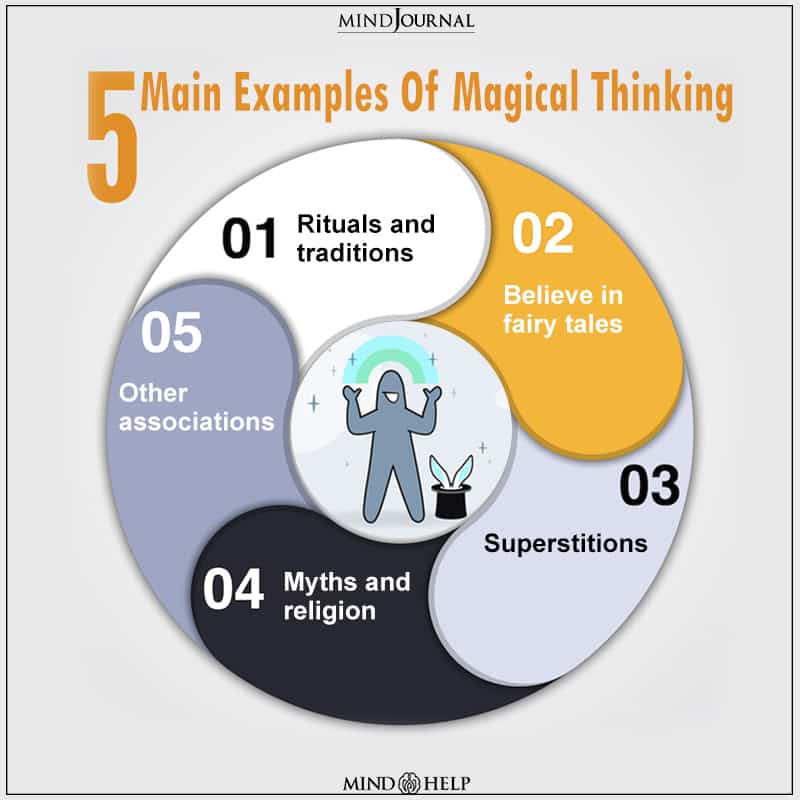
This thought process occurs based on questionable cause-and-effect relationships. It allows a person to hold false ideas which often leads to the person making poor decisions. This superstitious thinking can manifest anytime, anywhere. Some examples are quite universal while others are unique to a certain culture. The following are some of the most common examples of magical thinking in our everyday life.
1. Rituals and traditions
Rituals and traditions [mfn] Hobson, N. M., Schroeder, J., Risen, J. L., Xygalatas, D., & Inzlicht, M. (2017). The psychology of rituals: An integrative review and process-based framework. Personality and Social Psychology Review, 22(3), 260-284. https://doi.org/10.1177/1088868317734944 [/mfn] play a key role in this thought process. People tend to hold their critical thoughts to experience happiness. This practice is often associated with the enjoyment of culture. People appreciate certain rituals and traditions to cause a specific outcome of an event.
Some examples of rituals include:
- Wearing a lucky cloth or keeping a lucky charm on an important day
- Knocking on wood to prevent any misfortune
- Believing that 13 is an unlucky number
- Making wishes to the birthday candles, dandelions, or wishbones
2. Believing in fairy tales
Studies [mfn] Hu, Q., Yang, Y., Huang, Z., & Shao, Y. (2018). Children and Adults Prefer the Egocentric Representation to the Allocentric Representation. Frontiers in psychology, 9, 1522. https://doi.org/10.3389/fpsyg.2018.01522 [/mfn] have found that children up to 10 years old are mostly egocentric. They are more likely to think of themselves as the center of the universe. This often leads to the belief that they can control the happenings of the physical world. This is one of the reasons that children tend to believe in fairy tales and magical characters. Most of the children start to relate to themselves as the prince or princess of those fairy tales. This way of thinking starts to wear off around the age of 10. After a point of time, they begin to understand that fairy tales don’t exist in this natural working world.
3. Superstitions
This thought process doesn’t always result in a positive impact. Some people don’t have any belief in religions, but they may still be guilty of this superstitious thinking. Superstitions [mfn] Risen JL. Believing what we do not believe: Acquiescence to superstitious beliefs and other powerful intuitions. Psychol Rev. 2016 Mar;123(2):182-207. doi: 10.1037/rev0000017. Epub 2015 Oct 19. PMID: 26479707. [/mfn] appear in many forms across cultures. Superstitious beliefs may work for people every time, but these are considered to be examples of magical thinking. Some superstitions may be treated as a fun element of any culture while others may be taken quite seriously.
Some examples of daily superstitions include:
- Holding breath while passing by a graveyard
- Walking under a ladder can cause a misfortune
- Having a lucky charm for examinations or interviews
- Number 3 is related to every bad thing that happens
- A broken mirror can cause 7 years of bad luck
- A black cat crossing the road brings misfortune
4. Myths and religion
There are many religious stories present in history that explain the existence of God or any miraculous power. Science cannot prove the meaning of most of the stories. It cannot explain that God exists or a miracle can happen because of prayers. Researchers [mfn] Agorastos, A., Demiralay, C., & Huber, C. G. (2014). Influence of religious aspects and personal beliefs on psychological behavior: focus on anxiety disorders. Psychology research and behavior management, 7, 93–101. https://doi.org/10.2147/PRBM.S43666 [/mfn] considered many religious stories across all religions as the products of magical thinking.
Some examples of religious myths include:
- If someone can sacrifice something important to god, it will lead to an increase in rainfall this year
- Bulls get angry when they see anything in red color.
- Women accused of witchcraft were burned at the stake during the Salem Witch Trials.
5. Other associations
Another example of magical thinking is when an individual starts to link specific outcomes to some incidents or events that can ever cause them directly. For example, a kid has a habit of harming herself/himself whenever his/her parents scold.
Benefits Of Magical Thinking
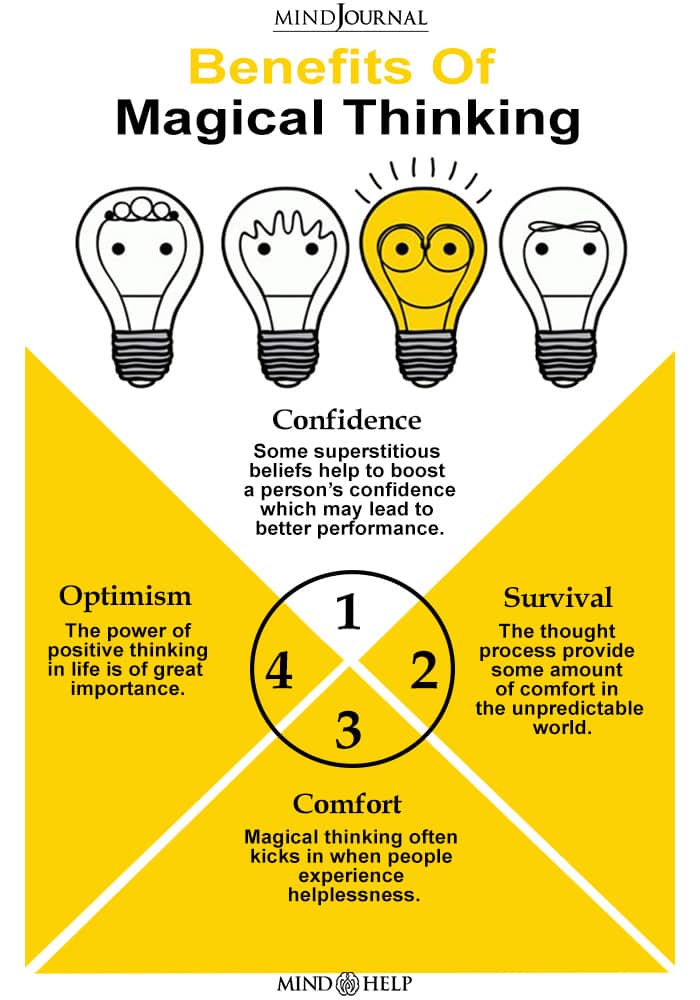
Good luck superstitions are considered to be a common way that engages people in magical thinking. Sometimes, beliefs can help one to perform better in a specific situation. A study [mfn] Brashier, N. M., & Multhaup, K. S. (2017). Magical thinking decreases across adulthood. Psychology and aging, 32(8), 681–688. https://doi.org/10.1037/pag0000208 [/mfn] suggested that such practices positively affect the result of people’s performance. Some of the important advantages of superstitious thinking include:
1. Confidence
Studies [mfn] Shweder, R. A., Casagrande, J. B., Fiske, D. W., Greenstone, J. D., Heelas, P., & Lancy, D. F. (1977). Likeness and likelihood in everyday thought: Magical thinking in judgments about personality [and comments and reply]. Current Anthropology, 18(4), 637-658. https://doi.org/10.1086/201974 [/mfn] have shown that this way of thinking can play a pivotal role in improving the performance of a person. Some superstitious beliefs help to boost a person’s confidence which may lead to better performance. Holding a lucky charm when a result of the performance is yet to be announced and keeping the fingers crossed in a difficult situation are some of the examples of it.
2. Survival
When people experience helplessness about an event or situation, magical thinking appears and often kicks in. Such superstitious rituals they practice allow them to feel that the situation is not entirely out of their control. It reduces the anxiety level by increasing their confidence and helps people to survive.
3. Comfort
The practices and the thought process provide some amount of comfort in the unpredictable world. This thought process helps them to feel more in control. A favorable outcome leads to the people believing in the power of superstitions.
4. Optimism
Magical thinking includes a form of positive thinking also. Researchers [mfn] Eagleson, C., Hayes, S., Mathews, A., Perman, G., & Hirsch, C. R. (2016). The power of positive thinking: Pathological worry is reduced by thought replacement in Generalized Anxiety Disorder. Behaviour research and therapy, 78, 13–18. https://doi.org/10.1016/j.brat.2015.12.017 [/mfn] suggested that the power of positive thinking in life is of great importance. There is some evidence [mfn] Fritzsche SD. The power of positive thinking. Plast Surg Nurs. 2012 Jul-Aug;32(3):93-4. doi: 10.1097/PSN.0b013e3182462666. PMID: 22929192. [/mfn] on how positive thoughts can change a person’s outlook on life and reduce stress and depression. This leads to relieving emotional distress.
Read More About Optimism Here
Drawbacks Of Magical Thinking
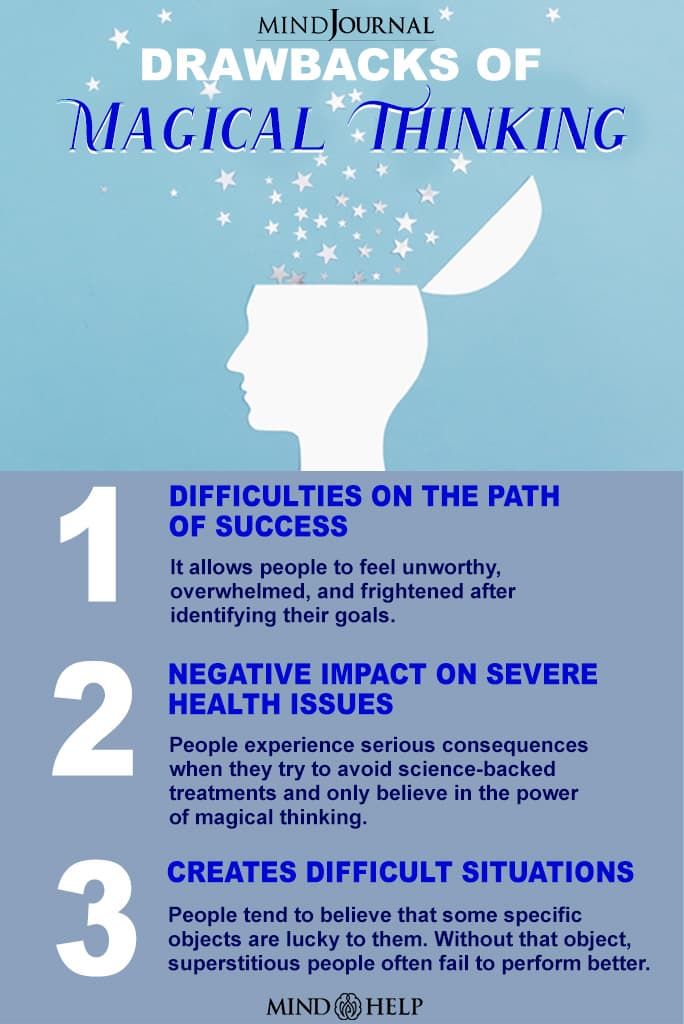
Despite having a few advantages, this thought process can create negative impacts also, such as:
1. Difficulties on the path of success
The negative part of it allows people to feel unworthy, overwhelmed, and frightened after identifying their goals. They make almost no effort of their own and don’t consider any other possibilities. This often leads to them experiencing a lot of difficulties to achieve success.
2. Negative impact on severe health issues
People may experience serious consequences if they try to avoid science-backed treatments and only believe in the power of magical thinking. When the people who suffer from this thinking disorder are diagnosed with any serious health issues, they try to pursue alternative treatments and superstitious practices that have no association with their diseases. These practices may lead to even the death of the people.
3. Creates difficult situations
This thought process makes a situation tricky when the belief is about an object. Some people tend to believe that some specific objects are lucky to them. Without that object, superstitious people often fail to perform better. They become extremely dependent on that object. It also raises a kind of fear and lack of concentration in them. Their stress sabotages their performances.
Magical Thinking & Mental Disorders
When magical thinking gets out of control and disrupts normal daily functioning, it can become a sign of a health concern, mostly in adults. A 2014 research paper [mfn] García-Montes JM, Pérez-Álvarez M, Odriozola-González P, Vallina-Fernández O, Perona-Garcelán S. The role of magical thinking in hallucinations. Comparisons of clinical and non-clinical groups. Nord J Psychiatry. 2014 Nov;68(8):605-10. doi: 10.3109/08039488.2014.902500. Epub 2014 Apr 16. PMID: 24738556. [/mfn] suggested that it is not an illness itself but is related to some mental health conditions. When a person loses control over his/her thoughts and beliefs, this condition starts to harm their mental and physical health. One should take this situation as a matter of concern as this thinking disorder can be a sign of an underlying mental condition. This type of condition usually feels uncontrollable for a person and may cause a lot of stress and anxiety.
Some of the mental health conditions associated with magical thinking include:
1. Obsessive-compulsive disorder
Studies [mfn] Einstein DA, Menzies RG. Role of magical thinking in obsessive-compulsive symptoms in an undergraduate sample. Depress Anxiety. 2004;19(3):174-9. doi: 10.1002/da.20005. PMID: 15129419. [/mfn] have shown that this thinking disorder is related to obsessive-compulsive disorder (OCD). The ones who suffer from OCD often engage themselves with specific rituals, traditions, compulsions, and obsessive thoughts. OCD allows people to take the common things from daily lives and twist them into maddening rituals. These practices never satisfy the impossible demands of OCD. This may cause a mental health disorder [mfn] West B, Willner P. Magical thinking in obsessive-compulsive disorder and generalized anxiety disorder. Behav Cogn Psychother. 2011 Jul;39(4):399-411. doi: 10.1017/S1352465810000883. Epub 2011 Feb 21. PMID: 21333031. [/mfn] which is called ‘Magical thinking OCD’.
After a while, this mental error becomes the foundation of all or most of a person’s OCD. Some people practice the rituals without having any beliefs in them while others may think that failing to perform those rituals will cause negative consequences. People with OCD tend to take responsibility for the safety and well-being of others and themselves. The expanded sense of responsibility is considered to be associated with animistic thinking.
Common obsessions of this mental disorder include:
- Failing to say specific things a particular number of times may cause a harmful outcome.
- Good thoughts and memories can erase out all the bad thoughts and memories.
- Failing to do certain things in a particular way may create a negative impact.
Common compulsions of this mental disorder include:
- Repeating certain things just to satisfy themselves.
- Engaging themselves with superstitious behaviors.
- Arranging items in a specific order every day at a specific time.
- Avoiding unlucky numbers, words, colors, items, places.
- Following a certain pattern of performing specific routines or rituals.
Read More About Magical Thinking OCD Here
2. Schizophrenia
This thinking disorder has been often associated with a schizophrenia [mfn] Jarosz M. Myślenie magiczne u ludzi zdrowych i w schizofrenii [Magical thinking in healthy people and in schizophrenia]. Psychiatr Pol. 1996 May-Jun;30(3):471-84. Polish. PMID: 8848507. [/mfn] spectrum disorder. Studies have explained that the auditory hallucinations experienced by people with schizophrenia are somehow interconnected with this thinking disorder. The patients diagnosed with schizophrenia are often identified by their eccentric behavior. People with this disorder often experience a strange pattern of thinking and accepting things, even the most natural ones. Schizophrenia is considered a chronic mental illness. The patients might take superstitions, magical thinking, and paranoid thoughts very seriously.
The symptoms experienced by the people with this disorder include:
- Avoiding communication with people that leads to a lack of relationship.
- Having unusual beliefs and behaviors.
- Having extreme faith in the existence of supernatural powers.
- Doubting others’ loyalty without any reason.
- Experiencing excessive social anxiety due to their paranoid fear.
Read More About Schizophrenia Here
3. Anxiety
Studies [mfn] West B, Willner P. Magical thinking in obsessive-compulsive disorder and generalized anxiety disorder. Behav Cogn Psychother. 2011 Jul;39(4):399-411. doi: 10.1017/S1352465810000883. Epub 2011 Feb 21. PMID: 21333031. [/mfn] have shown that people with anxiety disorder often experience the issue of magical thinking. They tend to think about certain incidents that have no realistic association with the physical world. The symptoms of anxiety may include:
- Believing that planning for every possible negative outcome can protect people from those happenings.
- Failing to take any concrete action due to their extreme worries.
- Being less realistic than others.
- Worrying about unrealistic impossible things.
Read More About Generalized Anxiety Disorder Here
When To Get Help
If a person’s physical and mental health get affected due to this kind of thinking, then one should take this condition very seriously. People who experience certain problematic and disturbing levels of magical thinking should consult a professional therapist before the condition deteriorates.
People should seek professional help when:
- The condition begins to affect one’s daily life.
- It causes anxiety and distress.
- The sufferer experiences uncontrollable thoughts.
- The negative thoughts trigger one’s feelings to hurt himself/herself or others.
- A person experiences unusual and persistent low moods most of the time.
- Extreme compulsive behavior.
- Extreme mood swings.
- Experiences excessive fear and worries.
- They start to see or hear such things that others cannot.
- The person needs to use substances to deal with the symptoms.
A therapist’s consultations can not only help people to cope with this thinking disorder but also help them to get rid of other mental health issues if they experience any.
Overcoming Magical Thinking
Despite having some positive impacts, magical thinking is considered to be giving people false hopes. In some cases, it can have positive impacts such as optimism, confidence, and comfort. But the nature of this kind of thought influences superstitious beliefs and unrealistic ideas that have no association with evidence and science.
Due to such situations, people with this thinking disorder can become mentally or physically harmful towards themselves and others, or spend essential resources on unimportant practices. However, anyone experiencing troublesome and disturbing magical thinking disorder should consult with a professional before things get worse.
Magical Thinking At A Glance
- Magical thinking is the belief that your thoughts, ideas, words, actions can influence the outcome of specific events in the material world.
- It can often lead to severe stress, anxiety, and phobias as their beliefs are solely based on superstition.
- They can often lead to certain psychiatric disorders, such as obsessive-compulsive disorder (OCD ) & schizophrenia , and may be harmful to others.
- Magical thinking reflects a basic link between people’s personal experiences and the surrounding world.
- By strengthening the imagination muscles, magical thinking provides enough empathy, confidence in the ability and encourages creativity.
- Magical thinking is one of the most common psychological processes among children aged 5-10 years.
- This thought process occurs based on questionable cause-and-effect relationships.
- Good luck superstitions are considered to be a common way that engages people in magical thinking.
- Magical thinking is considered to be giving people false hopes.
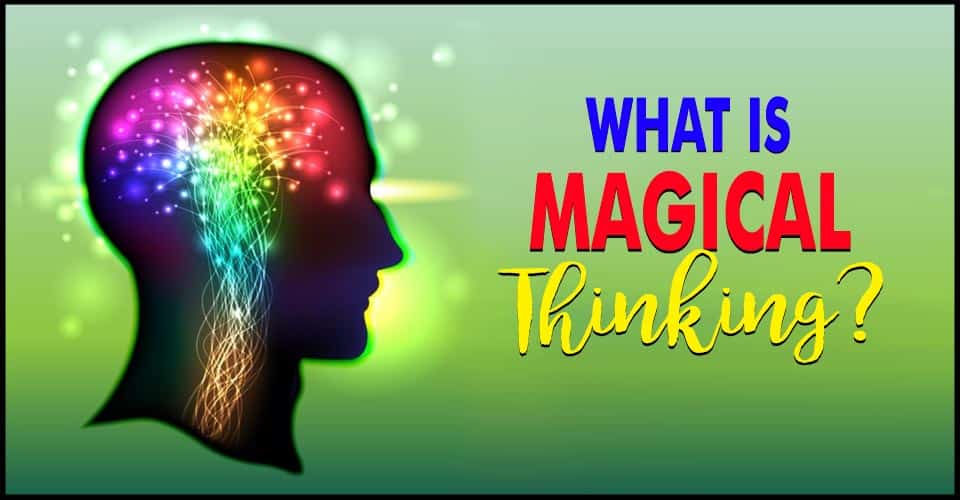

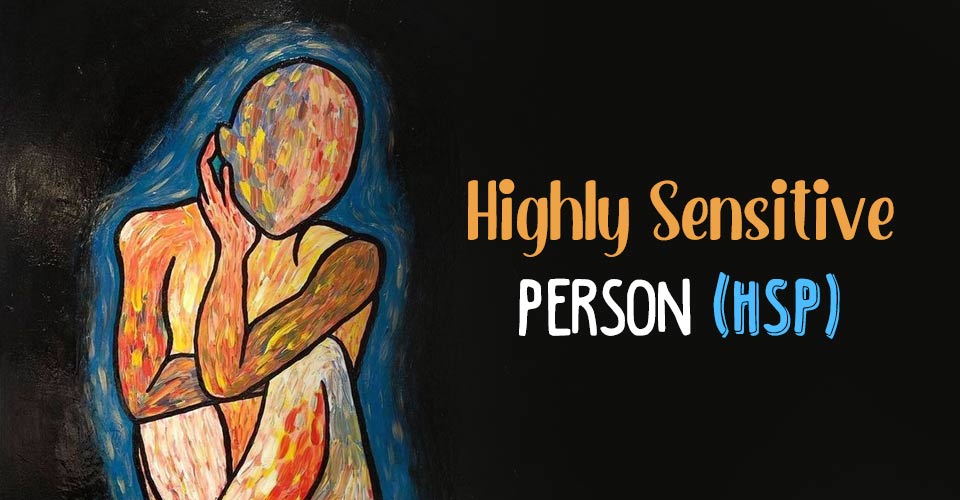

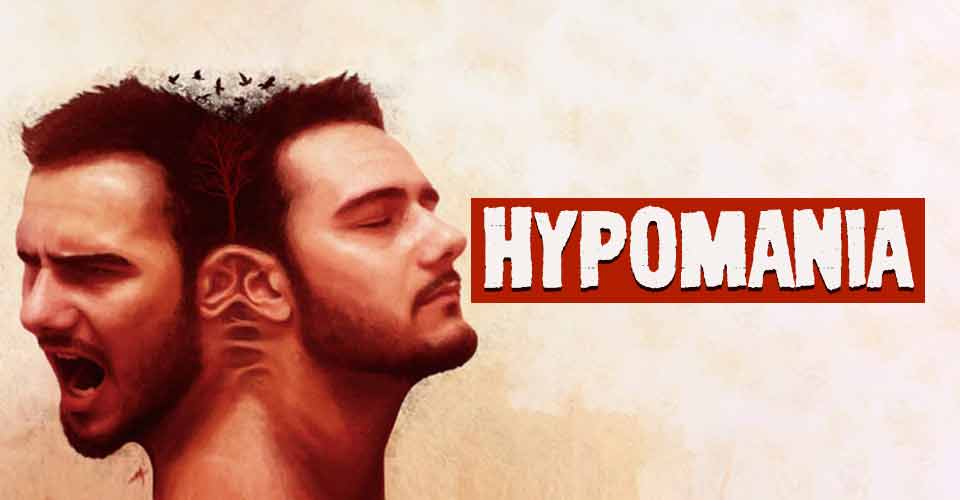



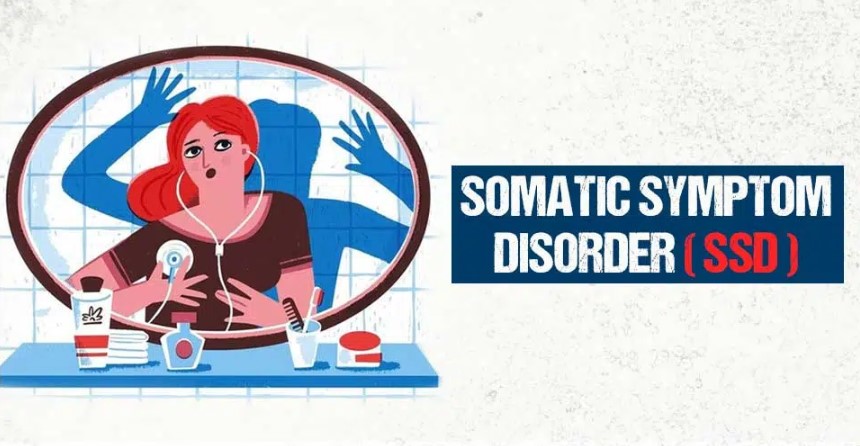

Leave a Reply